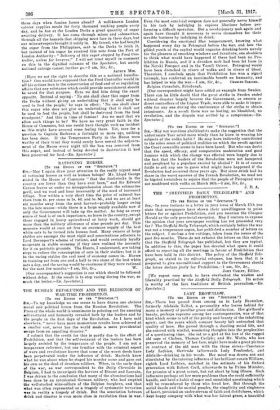THE RUSSIAN REVOLUTION AND THE BLESSINGS OF WAR-TIME PROHIBITION.
[To THE EDITOR Or THE " SPECTATOR.") SIR,—To my knowledge no one seems to have drawn one obvious moral and political lesson from the Russian Revolution. The Press of the whole world is unanimous in pointing out the amazing self-restraint and humanity revealed both by the leaders and by the people in the first days of the Revolution. As I have said elsewhere, " never have more momentous results been achieved at a smaller cost, never has the world made a more providential
e scape from an appalling disaster."
I submit that the credit for this is partly due to the effect of Prohibition, and that the self-restraint of the leaders has been largely assisted by the temperance of the people. I am not a temperance reformer, but one familiar with the criminal aspect of wars and revolutions knows that some of the worst deeds have been perpetrated under the influence of drink. Macbeth knew what lie was about when he staged his murder scene and gave out his own as the deed of drunken soldiers. When, in the early days of the war, as war correspondent to the Daily Chronicle in Belgium, I had to investigate the horrors of Dinant and Louvain, I was driven to the conclusion that many of the abominations had been done by an intoxicated German soldiery, who had emptied the well-stocked wine-cellars of the Belgian burghers, and that what was often represented as a tragedy of systematic terrorism was in reality a tragedy of drink. But the association between drink and disaster is even more close in revolution than in war.
Even the most convivial surgeon does not generally nerve himself to his task by indulging in copious libations before per- forming a difficult operation. But a revolutionary mob again and again have thought it necessary to nerve themselves for their terrible business by indulging in drink.
Considering the emotional Slav temperament, knowing what happened every day in Petrograd before the war, and how the gilded youth of the capital would organize drinking-bouts merely for the pleasure of smashing windows and furniture, one shudders to think what would have happened if there had been no Pro- hibition in Russia, and if a drunken mob had been let loose in the Nevski Prospect and in the Vassili Ostrov. Petrograd would have been drenched in rivers of vodka and in rivers of blood. Therefore, I conclude again that Prohibition has won a signal triumph, has conferred an inestimable benefit on humanity, and
has helped to win the war.—I am, Sir, &c., CHARLES SAROLEA. Belgian Consulate, Edinburgh.
[Our correspondent might have added an example from Sweden. There can be little doubt that the great strike in Sweden ended without disaster largely because the Government, as owners or direct controllers of the Liquor Trade, were able to make it impos- sible for any one during the continuance of the strike to obtain intoxicants. As a result there was no looting, no bloodshed, no revolution, and the dispute was settled by a compromise.—ED. Spectator.]


























 Previous page
Previous page